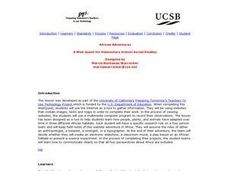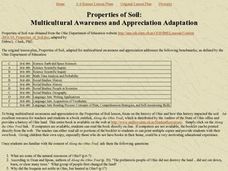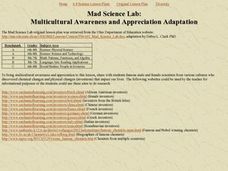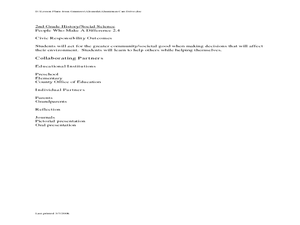Curated OER
African Adventures
Students access the Internet to gather information. They record their observations of African habitats. They create either an electronic slideshow or mural to present a science experiment.
American Museum of Natural History
Welcome to the Dzanga-Sangha
One ecosystem is home to numerous habitats—how diverse are they? Pupils interact with an online lesson to explore three habitats in a rain forest ecosystem. They discover connections between species and how they depend on each other for...
Curated OER
Rainforest Rescue
Students explore threats to diversity in the Central African rainforest. They use a guided website to research animals that are threatened with extinction, examine human uses of the rainforest and think about what they can do to help...
Curated OER
Changes in the Community: Diversity of Learners Adaptation
Students determine the rate of travel through Ohio based on mode of transportation: walking, horse bak riding, railroad, and car. They are asked to write a sentence explaining how they would determine how long each trip takes. Students...
Curated OER
Plotting Earthquakes: Diversity of Learner Adaptation
Students are divided into four groups that study four separate ecosystems in the community. They first do a field examination for the purpose of developing a detailed report of an ecosystem. Students do a detailed analysis of the...
Curated OER
Going...going...gone? Tropical Rainforests-How They Work, What They Do for Us, What's Being Done to Them...
Sixth graders explore the Tropical Rainforest and come to understand what it is and how it affects the ecosystem. In this rainforests lesson, 6th graders write about the Tropical Rainforest, imagine they are in the Tropical Rainforest,...
Curated OER
Properties of Soil
Students encounter various pieces of knowledge utilizing lessons that addresses a diversity of learners with multiple intelligences. They cover various concepts: science, Earth, scientific inquiry, geometry, data analysis, probability,...
Curated OER
Mad Science Lab
Students explore a number of activities that are focused on the process of learning using many different types of strengths. The strengths are classified using Howard Gardner's Theory of Multiple Intelligences.
Curated OER
Tracking Satellites Using Latitude and Longitude
Students participate in activities based upon the concepts of latitude and longitude. They apply the fact that technology can be used in our society for a variety of uses. This should help students reflect upon the role of technology.
Curated OER
The Sun-Earth Connection
Third graders research about the location of different planets from the sun. In this earth science lesson, 3rd graders discuss the weather in their place and identify common weather terminologies. They explain how tornadoes form and...
Curated OER
Sense-sational
Students investigate the five senses. They participate in the activity for one week with each day devoted to one sense being sight, taste, sound, smell, and touch. They also cover the concept of being part of a global community where one...
Curated OER
Aluminum Can Drive
Second graders complete a recycling project to clean-up their school. In this service project lesson, 2nd graders assess their campus for litter, set up a recycling project, clean up their campus, and recycle the trash. Students also...
Curated OER
"Home Sweet Home?"
Students research an endangered animal's habitat, investigate the survival problems. They research the animal's zoo life. They research some programs of reintroduction and chart the pros and cons of each.














